How Much Does It Cost to Outsource Social Media Marketing?

Social media is the best possible venue for content marketing, or it's dying, depending on who you ask.
I would argue that it's both.
Social media is immense. Vast amounts of the average user's daily internet users are on Facebook, Twitter, TikTok, Instagram, or Reddit. It's also true that some of those platforms are on the decline. Facebook, in particular, has been bleeding users for a while now.
On top of that, we have issues with paid advertising in general. Advertising has been slowly getting more and more intrusive. With all of the tracking available to ad networks like Google and Facebook Ads, it's easier than ever to be eerily accurate with your targeting and aggressively targeting potential customers by interest, age, gender, and even the type of food they eat.
Social media marketing is about building and engaging an audience, not paying money for exposure. That's why many social media ad campaigns are not considered "paid advertising," or if it's paid, it's promoting organic posts. Though, of course, you can still do that too.
Every B2C business and most B2B businesses can benefit from social media marketing. Unfortunately, social media marketing can be an incredible money sink, especially if you don't do it right. So, it's essential to know how much it can add to your digital marketing budget.
I've put together this post to give you an idea of the expenses you might be looking at before outsourcing your social media marketing to the pros.
Let's get started!
Social media marketing can be considered a top-of-funnel strategy. It's best to use it to build exposure and grow awareness of your business and your products. It can then help forward people from those social networks to your website, whether to read blog posts, browse product pages, peruse a landing page, or even make a purchase.
And, of course, platforms that have detailed analytics (like Facebook) offer a wealth of data about your audience, which you can use in future messaging.
It's well worth the time, effort, and expense to use social media if you use it properly.
An excellent social media marketing plan requires quite a bit of time, effort, and skill. You probably won't be able to do it alone. Most businesses have a social media team involving employees, contractors, freelancers, or even contracted agencies.
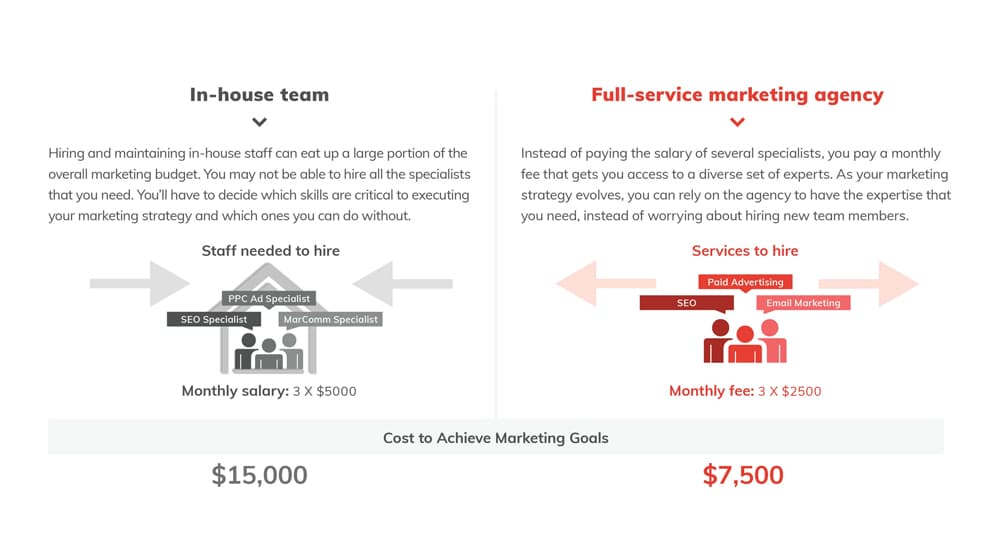
An ideal social media marketing team has individuals capable of:
- Compelling graphic designs.
- Persuasive short-form copywriting.
- Video production, editing, and publication.
- Data monitoring, optimization, and analysis.
- Paid advertising management with knowledge of finding your ideal target audience.
- Customer service, sentiment analysis, and brand monitoring.
- An influencer marketing team, pitching prolific accounts and establishing valuable partnerships.
You can handle some of this with automatic tools and analysis platforms. Still, you need content creation experts, graphic designers, a community manager to interact with other people, and a marketer to make data-driven decisions sooner or later.
So, either you need to hire a marketing agency that can do most of this for you or hire or contract people who can do it while managing them. You can begin to see where the costs come from.
It isn't easy to give any precise range of prices for social media marketing because so many different factors can influence that price. There are small brands out there paying a hundred dollars a month on advertising and doing perfectly well. Brands are spending 100x that amount and struggling. Meanwhile, major corporations don't bat an eye at spending six or seven figures on each social media platform.
Here's a rundown of the factors that can influence social media marketing costs.
1. Which Networks Are You Going to Use?
There are dozens of social media channels out there. Which networks do you want to use to promote your brand?

Consider:
- Facebook has the largest audience out of nearly any site on the internet and gives you the most significant possible reach with the most direct targeting options.
- Instagram is tied to Facebook, and while it has a vast audience, it has a higher barrier to entry.
- TikTok is extremely popular but requires knowledge and expertise in video production.
- Twitter is massive and extremely popular for customer service, among other things.
- LinkedIn is the most popular network for professional connections and B2B marketing.
- YouTube is immensely popular if you can produce compelling video content.
- Pinterest has issues but has a massive audience of people in specific demographics you might have a hard time finding elsewhere.
- Tumblr has had massive ups and downs over the years but is excellent for targeting younger millennials.
- Reddit is swiftly becoming one of the most popular locations for user discussions, reviews, and expertise.
This list doesn't even get into some of the social channels that double as popular messengers, like WhatsApp or Snapchat, or any networks popular in other countries, like Baidu, Viber, Weibo, QQ, or VK.
The more platforms you want to use, the higher the cost. There are three reasons for this.
1. First, it's a sheer amount of time consideration. You need people to post, watch, monitor, analyze, and engage with users on those platforms. The more person-hours you need to spend, the more you need to pay.
2. Second, the tools you use to manage these platforms often have limitations on the number of profiles you can handle at a time. If you want one or two, you're looking at cheaper plans; if you need five, six, or ten or more, you need to pay for higher-tier programs.
3. Third, any business features, paid plans, paid ads, or add-ons you use on any platform can add up. Running paid social media campaigns to promote posts on Facebook is one cost; promoted tweets is another; premium InMails on LinkedIn is another, and so on.
The costs of these ads can stack up quickly.
2. How Frequently Do You Want to Post on Each Network?
The more social media content you need to create, the more you need to pay.
On top of that, like with the number of profiles, many platforms have caps on the number of posts you can make via their service each month. These caps are fine for small businesses running 1-2 social networks, but if you're running five or six or posting five times a week, you can hit that cap very quickly.
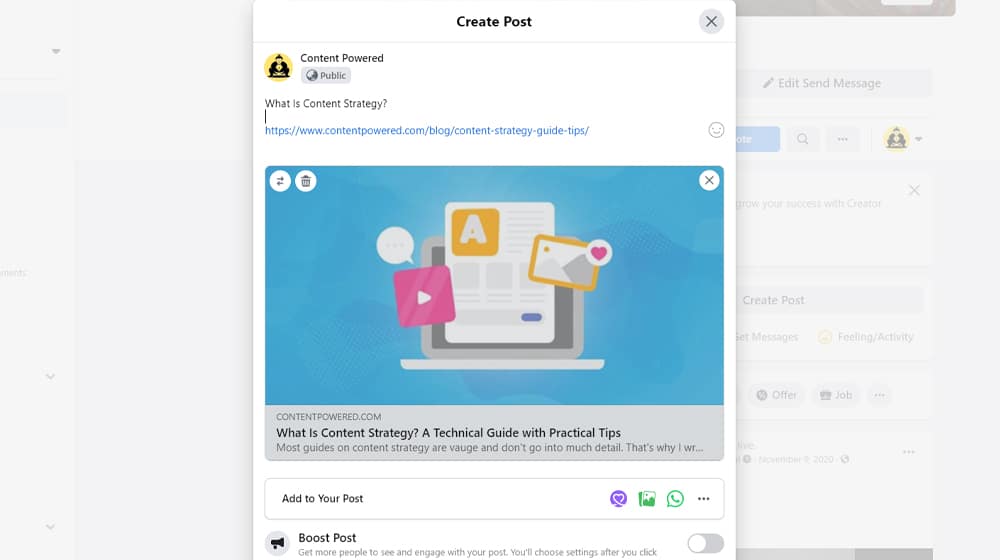
When you consider that each social network has its ideal number of times to post each week, you can see how you can quickly reach a point where you're spending quite a bit of money just creating that constant flow of content.
3. The Cost of Post Promotion
Every social network has some way to promote content since it's a big way that they make money. I've mentioned it a few times already, but one of the primary uses of ad spending on social media is not direct PPC display ads. It's promoting individual posts. On Twitter, you can promote tweets or even purchase a promoted trend. On Facebook, you can boost posts to show them to specific groups of people.
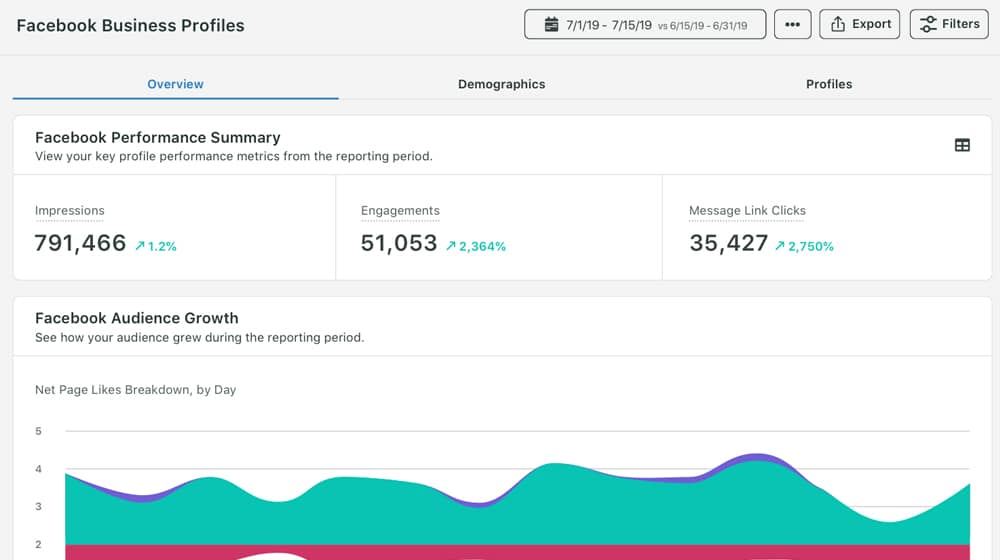
Now, you're not going to be promoting every post you make. Posts that you promote should be unique in some way. But, even the overhead of analyzing which posts to promote, gathering data, and developing ROI equations - it's all a cost. And, of course, you can spend tons of money boosting posts. With loose targeting options and high caps, you can spend hundreds or thousands of dollars promoting a single post.
Some companies will run your paid campaigns for you for an additional fee on top of the cost of the advertising itself. You could be looking at an additional $500 to $2,000 per month for such a service. It isn't uncommon for most paid ad agencies to require a $10,000/mo minimum ad spend.
4. The Cost of Data Analysis
Social media platforms are packed full of data you can harvest, for the most part. Sure, sites like Reddit don't have a ton for you, but Facebook? They'll overwhelm you with data.
That's part of the problem. There's so much data there that you need someone who studies that data professionally to tell you what the reports even mean and what conclusions you can draw from them. Even third-party analytics platforms can only help you so much if you don't know what is and isn't essential.
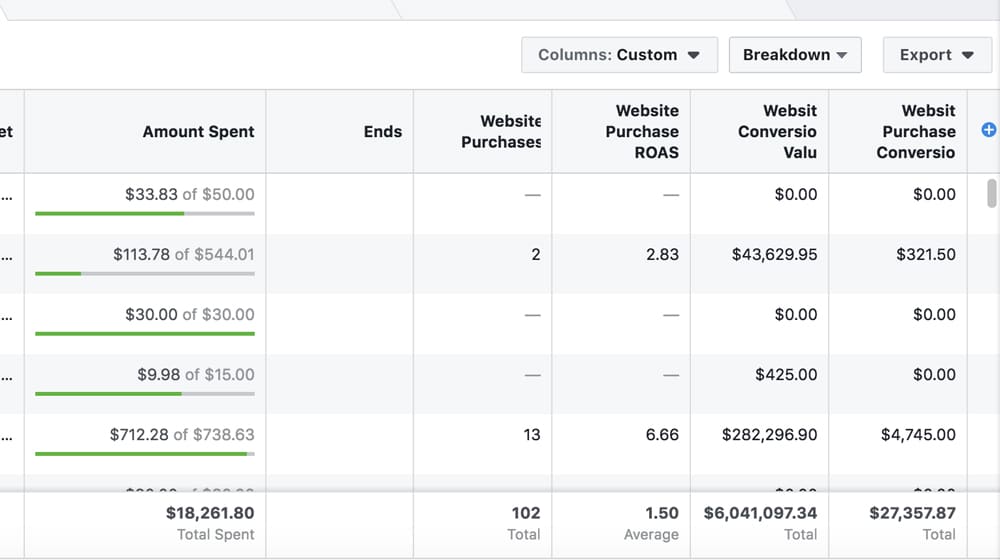
Data scientists and analysts often pull in salaries ranging from $50k to $200k annually. On top of that, you may have specific fees for activity audits performed at least once a year, and those will run you a few grand each time.
Oh, and did I mention competitive analysis? Yeah, analyzing your profile is "easy mode." You have access to all of your data analytics. But, you're not alone; you need to be aware of what your competitors are doing, how they're branding themselves, engaging with their audience, and how well they're doing. Competitive analysis and monitoring are other specialties that require even more time and money.
5. Strategy and Management
Everything above falls under social media marketing, but you can't just fire and forget each component. These elements need to work together towards a common goal with a common social media marketing strategy.

The whole team needs management and oversight. At the bare minimum, that's another salary you need to pay for a marketing manager.
6. Additional Factors That Can Influence Costs
Here's a question: what techniques will you be using to grow your presence? A contest or sweepstakes are standard techniques to build awareness, grow your audience, and engage with your users.
Every contest you run comes with overhead, though:
- You have to pay for a platform like Gleam to manage it.
- You have to pay for the value of the prizes you hand out.
- You need to pay people to manage the overhead of the contest.
This strategy is just one more incidental cost that can add up when you want to use social platforms for marketing. Contests can run from $200 for a quickly-coded platform to $7,000 for a full-service suite and some nice prizes.

Another incidental cost is automation. There are many ways you can implement little bits of automation, whether it's automatic cross-posting or reposting, or scheduling. Often, the services (like dlvr.it, Zapier, or IFTTT) that provide the automation charge money.
The Pros and Cons of Service Providers
There are generally three different ways you can put together a social media team and handle your social media marketing.
- Hire people to do the jobs for you, pay them salaries, and guide them under your management.
- Contract people for specific tasks like copywriting or graphic design.
- Contract with a company that does everything with its roster of employees or freelancers.
Each of these options has pros and cons. Here's a rundown.
Employees can be a great asset for managing your social media presence. They're engaged with your brand and are more intimately aware of it than people outside, for good or ill. They're more reliable and don't have the conflict of interest of working with multiple clients.

On the other hand, it costs several thousand dollars to hire an employee (on average). You need to train them and make sure they have the skills you're hiring them to have and pay a salary (which is often more expensive than freelancer or agency contracts) and benefits. All of the costs of platforms and tools are also your responsibility.
Freelancers are the cheapest option on the surface. Why pay a copywriter a $60,000 salary when you can pay them $40 for a social media post whenever you need them? Even at five posts a week, that's only $10k a year. Freelancers are also flexible and more likely to have skills they can demonstrate since they're selling their services on the back of those skills. You don't need to train them beyond building familiarity with your processes and brand.
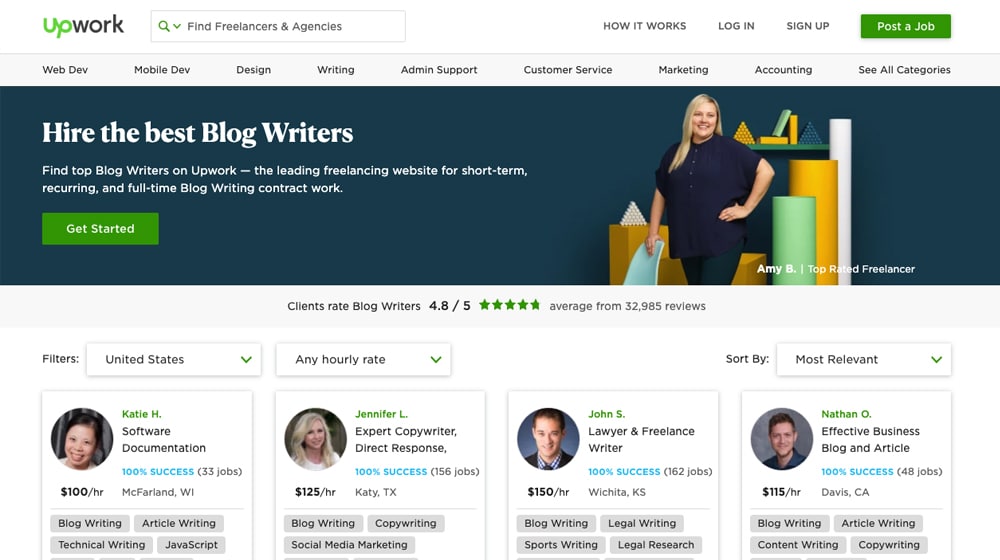
On the other hand, freelancers have multiple clients and inherent conflicts of interest. Their rates can suddenly change unless you have ongoing contracts, which many don't like to sign. You also don't get to control their hours, so they may be harder to communicate with than you would like. And, if a better offer comes along and you're their least lucrative of their pickiest clients, they can drop you with little repercussion, leaving you in a sticky situation.
Agencies come with their in-house marketing experts, tools, and management; everything they need to run your social media marketing. They likely have plenty of experience in data analysis and can make better decisions than your team can. They may even have access to people with skill levels and experience much more significant than you would be able to afford if you hired those people individually. They are also surprisingly cheap compared to DIY methods since they can leverage bulk discounts and agency rates split amongst their clients.
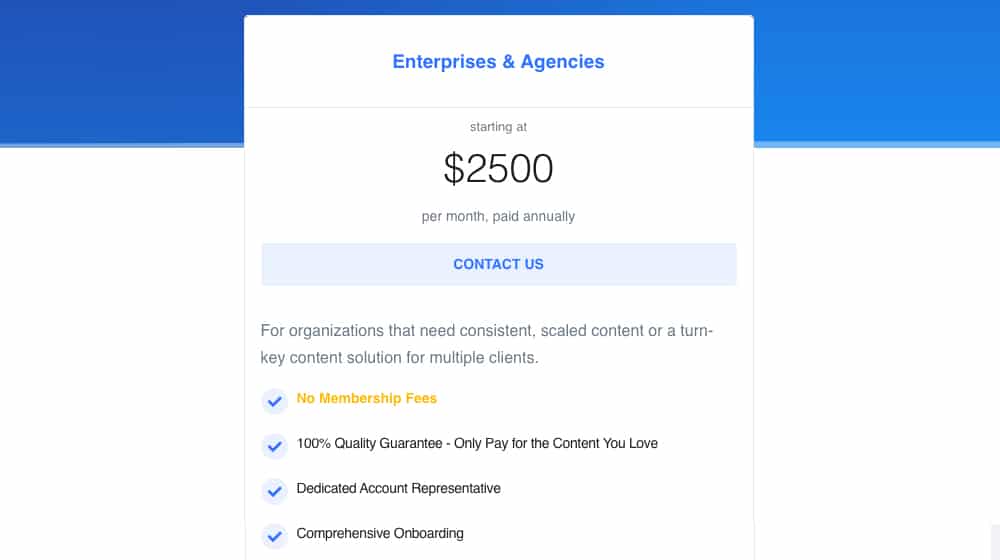
On the other hand, if the social media marketing agency is challenging to communicate with or review their practices, adjusting can be a huge hassle. If they try to take more control than you want them to have, it can be difficult to dial back, and if you cancel a contract, it might be impossible to get certain kinds of data from them. And, of course, "cheaper than hiring those social media experts individually" doesn't mean cheap. Their social media management costs are still relatively high.
There's no one correct answer here; each of the three options works for different kinds of businesses with varying needs in marketing.
- If you need full service or a fire-and-forget solution, go with an agency.
- Hiring a freelancer or two is generally your best option if you have a very tight budget.
- If you need precise control over branding and the actions of your marketer, an employee is an excellent way to go.
Moreover, as your business grows and your social marketing needs change, you might need to transition from one option to another.
How Much Should You Expect to Spend?
For all of the reasons above, it isn't easy to estimate how much you'll need to spend to manage your social media marketing.
Even then, you're looking at spending dozens of hours a week doing time-consuming management and marketing work yourself; after all, when you go with low-cost providers, you cover the rest with your own time.
According to WebFX, most companies spend between $4,000 and $7,000 per month on social media marketing. That includes everything from the cost of copywriting to the platforms you pay to manage it to the cost of PPC ads and boosted posts themselves.
The Content Factory has a broader range; they estimate anywhere from $1,000 to $20,000 per month. If you consider something like $2,000 to $4,000 per platform and want to run marketing on five platforms, it adds up quickly.
Do you pay for social media marketing services, and if so, how much does it cost you? Why not add your data? Please share with us in the comments below to get a helpful conversation started!



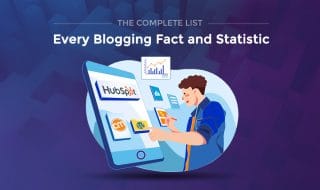
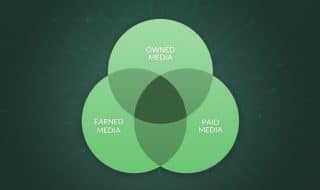





January 19, 2024
Thanks for the article! Was great to learn about the financial aspects of social marketing.
January 19, 2024
Cheers! Thank you!